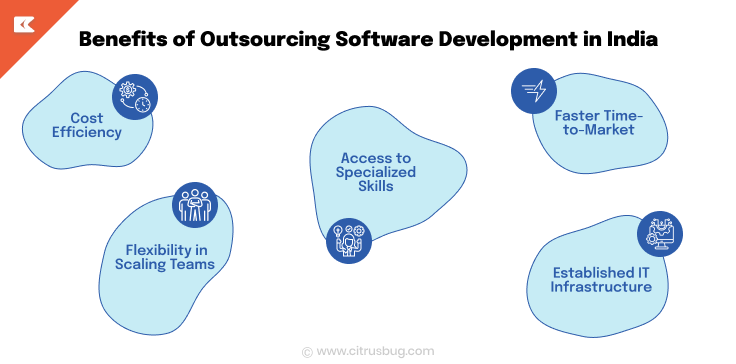The Complete Guide to Outsourcing Software Development in India
- November 15, 2024
-
2527 Views
- by Ishan Vyas
Table of Contents
- Why Choose India for Outsourcing Software Development?
- Benefits of Outsourcing Software Development in India
- How to Choose the Right Software Development Company in India
- Key Considerations Before Outsourcing Software Development in India
- Popular Outsourcing Models in India
- How to Form a Successful Outsourcing Collaboration
- Common Challenges in Outsourcing Software Development and How to Overcome Them
- Future Outlook: The Growth of Software Development in India
- Conclusion

Outsourcing software development saves costs and addresses core competencies in the business. India is also one of the cost-effective options as it has a huge talent pool. According to Precedence Research, the IT outsourcing market is expected to reach a value of $1.06 trillion by 2030. About 24% of executives choose software development outsourcing as a strategic way to access qualified developers at affordable prices and maintain competitiveness in the ever-changing business environment.
This guide enables you to get down to knowing everything about outsourcing software development services to India.
Why Choose India for Outsourcing Software Development?
For decades, India has been a global IT services hub, and many still choose it for business reasons:
Cost Advantage: Cost of Outsourcing software development to India is much cheaper than to other Western countries without compromising on quality.
Large Talent Pool: The numbers of IT professionals produced each year in India are vast, with sound proficiency in programming languages, frameworks, and emerging trends.
Good Communication Skills: Since the language used is English, Indian developers will have easier communication that minimizes risks for miscommunication and the delay of a project.
Proven Track Record: Many multinationals successfully outsourced to India and made India a well-trusted partner in providing their software development services.
Benefits of Outsourcing Software Development in India
1. Cost Efficiency
The prices India offers are also more competitive, often 60-70% lower compared to North American or European rates. This creates huge cost benefits, which can free up more money for other strategic initiatives such as the development of products, marketing, and expansion plans of businesses.
2. Access to Specialized Skills
Indian IT engineers are very skilled in web and mobile app development to cloud computing, AI or blockchain. You may gain access to rather specialized knowledge that otherwise would have needed hiring and training people.
3. Flexibility in Scaling Teams
Outsourcing allows one flexibility in terms of team size and the skills required, considering the project needs. This also ensures that you only pay for the resources needed, either short term or ongoing.
4. Established IT Infrastructure
India’s software development industry is largely supported by its established and reliable IT infrastructure. It has cutting-edge hardware and software tools and is home to numerous IT parks. The Indian government is credited with giving the IT industry tremendous support by providing a number of incentives that allowed it to grow.
The government developed a number of policies that helped the IT industry grow. Software development firms can provide excellent services and manage even complex projects more effectively thanks to state-of-the-art IT infrastructure.
5. Faster Time-to-Market
The most well-known attributes of Indian developers are their increased output and extraordinary capacity to complete projects on short notice without sacrificing quality.
Based on your software development needs, they develop the best plan of action and execute it flawlessly to deliver the finished products on schedule. They guarantee constant workflow, which lengthens project timelines and aids in a company’s quick product launch.
How to Choose the Right Software Development Company in India
It’s important to carefully consider your options when choosing an Indian software development company. Doing your homework on potential partners can help your collaboration succeed. And here are some tips for you:
- Evaluate Expertise and Portfolio: First, identify a company with experience in your industry and capabilities in relevant technologies and develop expertise. You can get an insight into this through their portfolio and various testimonials by different clients.
- Communication and Project Management: There are key components in communication and project management. Communicate well with the company to ensure that there would not be any sort of misunderstanding and further delay in the project due to lack of knowledge.
- Check for Data Security Practices: Outsourcing requires quite high security of your data. Ensure that the company upholds international data protection standards and has best practice safe-guarding of your data.
- Cultural Compatibility: Although India is well aware of how to work with a global client, it is vital that the company’s values and work culture resonate with your business needs.
- Time Zone Advantage: India has a time zone that enables full development with round-the-clock continuation thus speeding up the turnaround times of projects.
Key Considerations Before Outsourcing Software Development in India
1. Define Your Project Scope and Requirements
Clearly outline the project requirements in terms of what you want to achieve, timelines, and what you would expect as an outcome before you approach companies. That way, you are going to communicate clearly, but it also gives the service provider an opportunity to check if they can meet your needs based on the nature of their experience and capability.
2. Consider the Cost to Outsource Software Development
While cost advantage is provided by India, one should also critically analyze the costs involved so that hidden costs do not surface. Also, additional costs may be incurred toward project management, quality assurance, and maintenance along with the development costs.
3. Legal and Contractual Considerations
Outsourcing requires drafting a clear contract. First, it outlines the project timelines, payment terms, intellectual property rights, and confidentiality agreements. One should consult a legal expert who deals with international contracts.
Popular Outsourcing Models in India
There are many different outsourcing models, and the need for your project and budget decide which you can use:
- Fixed Price Model: It is appropriate when the project’s requirements are well defined. You pay a predetermined price, regardless of the actual time or effort taken.
- Dedicated Team Model: This is the traditional dedicated team model, where you hire a team that will work only for your project. It best suits very long-term projects or if you need support on a constant basis.
- Time and Material Model: You pay for the actual hours worked in this model
- This way is flexible and ideal for projects with constantly evolving requirements.
- Project-Based Outsourcing: Outsource an entire project to a software development company by using this model. This would be perfect for businesses that want to simply get the finished product ready for delivery without getting too involved.
How to Form a Successful Outsourcing Collaboration
To have a smooth and productive experience with outsourcing, consider the following steps:
1. Establish Clear Communication Channels
The tools and platforms to be used for communication should be decided on, and regular check-ins ensured. Clarity in communication minimizes misunderstandings and fosters transparency.
2. Set Measurable Milestones
Define project phase milestones: planning, design, development, testing, and deployment. These are what will keep the track of the project on schedule.
3. Prioritize Quality Assurance
Quality needs to be achieved since a project targeting a specific result has to end up being of prime quality. The quality assurance team needs to be part of the company team, and testing has to be done and integrated at every stage of the development process.
4. Monitor Progress and Performance
Monitor their progress frequently, give them feedback, and change your schedule as required. You can hold the outsourcing team responsible for their performance because in this way, the project will be according to your expectation.
Common Challenges in Outsourcing Software Development and How to Overcome Them
Although there are so many advantages of outsourcing software development in India, yet the following is some of the possible challenges:
- Cultural and Language Differences: Most Indian software developers are normally English fluently proficient, and there are certainly certain moments when cultural nuances lead one to misunderstand. A clear communication process helps bridge any cultural gaps.
- Time Zone Differences: While India’s time zone does have an advantage in allowing 24/7 development, it does mean there is a lack of real-time communication. This can be covered by overlapping hours for meetings in such cases.
- Project Delays: When things are not supposed to take so long, then there will be delays. For example, if there is a mid-project change in requirements, then there will be delays. Stating clear timelines and being flexible enough with your schedule can minimize delays.
Future Outlook: The Growth of Software Development in India
India’s IT industry is now touching the sky and will continue to do so by being very strong at emerging technologies like, artificial intelligence, machine learning, and cloud computing. Indian firms have heavily invested in this upskilling of employees where demand for software development is at a high level. Thus, India will be even more inviting as a destination for businesses looking to outsource.
Conclusion
With the depth of talent and the kind of specialization available, outsourcing software development in India is a cost-effective approach. Proper planning, collaboration, and well-executed planning would enable successful project outcomes from partnering with any software development company in India. Businesses can reap maximum benefits from outsourcing through proper business case formulation, effective communication, and measurable milestones with an appropriate outsourcing model.





 SaaS Development
SaaS Development Web Application Development
Web Application Development Mobile Application Development
Mobile Application Development Custom Software Development
Custom Software Development Cloud Development
Cloud Development DevOps Development
DevOps Development MVP Development
MVP Development Digital Product Development
Digital Product Development Hire Python Developers
Hire Python Developers Hire Django Developers
Hire Django Developers Hire ReactJS Developers
Hire ReactJS Developers Hire AngularJS Developers
Hire AngularJS Developers Hire VueJS Developers
Hire VueJS Developers Hire Full Stack Developers
Hire Full Stack Developers Hire Back End Developers
Hire Back End Developers Hire Front End Developers
Hire Front End Developers AI Healthcare Software Development & Consulting
AI Healthcare Software Development & Consulting Healthcare App Development
Healthcare App Development EHR Software Development
EHR Software Development Healthcare AI Chatbot Development
Healthcare AI Chatbot Development Telemedicine App Development Company
Telemedicine App Development Company Medical Billing Software Development
Medical Billing Software Development Fitness App Development
Fitness App Development RPM Software Development
RPM Software Development Medical Device Software Development
Medical Device Software Development Patient Engagement Software Solutions
Patient Engagement Software Solutions Healthcare IT Consulting
Healthcare IT Consulting Mental Health App Development
Mental Health App Development Lending Software Development Services
Lending Software Development Services Payment Gateway Software Development
Payment Gateway Software Development Accounting Software Development
Accounting Software Development Mobile Banking Software Development
Mobile Banking Software Development Supply Chain Management Software Development
Supply Chain Management Software Development Fleet Management Software Development
Fleet Management Software Development Warehouse Management Software Development
Warehouse Management Software Development LMS Development
LMS Development Education App Development
Education App Development Inventory Management Software Development
Inventory Management Software Development Property Management Software Development
Property Management Software Development Real Estate CRM Software Development
Real Estate CRM Software Development Real Estate Document Management Software
Real Estate Document Management Software Construction App Development
Construction App Development Construction ERP Software Development
Construction ERP Software Development
















